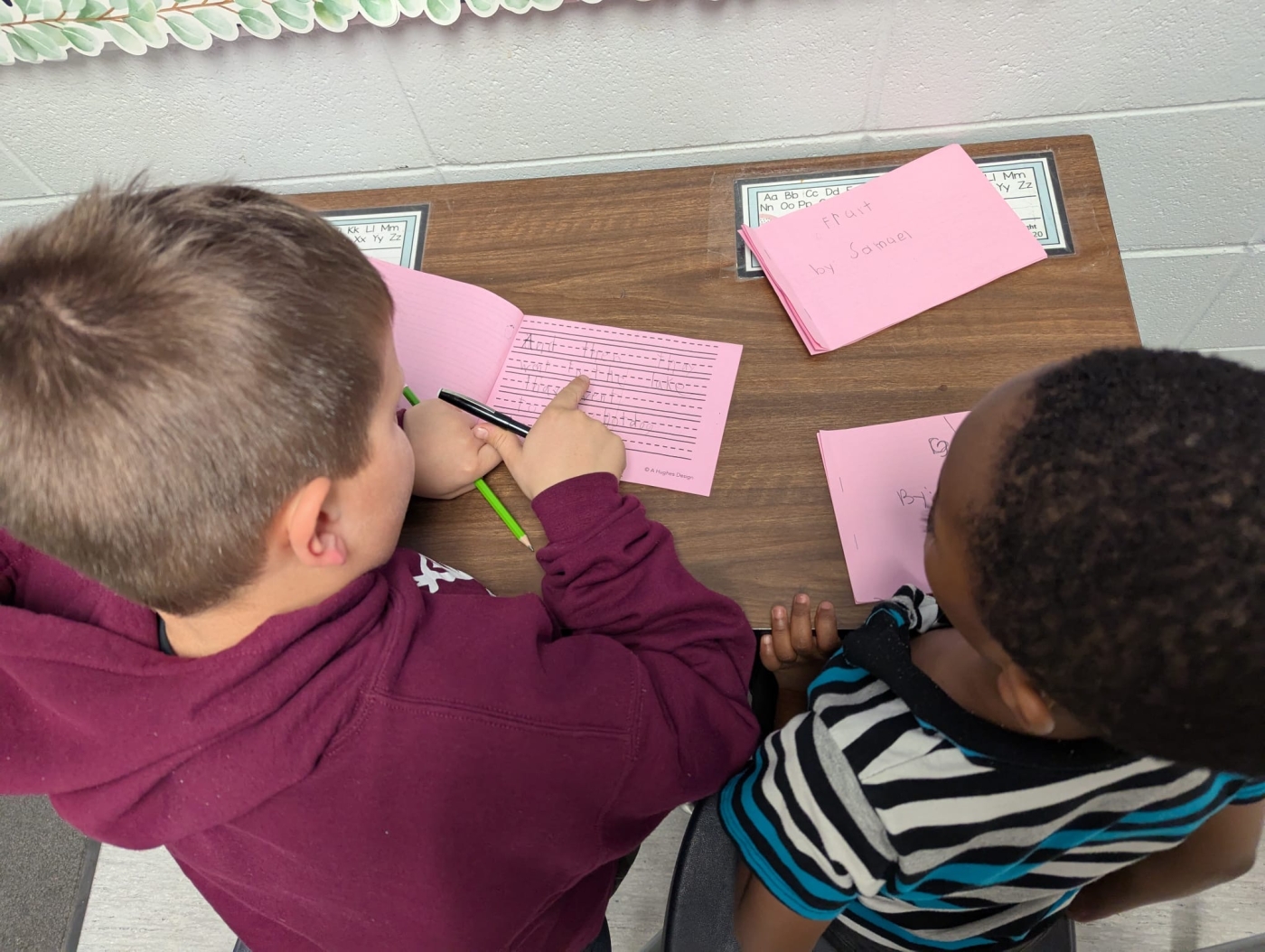Don Christian Elementary 24-25
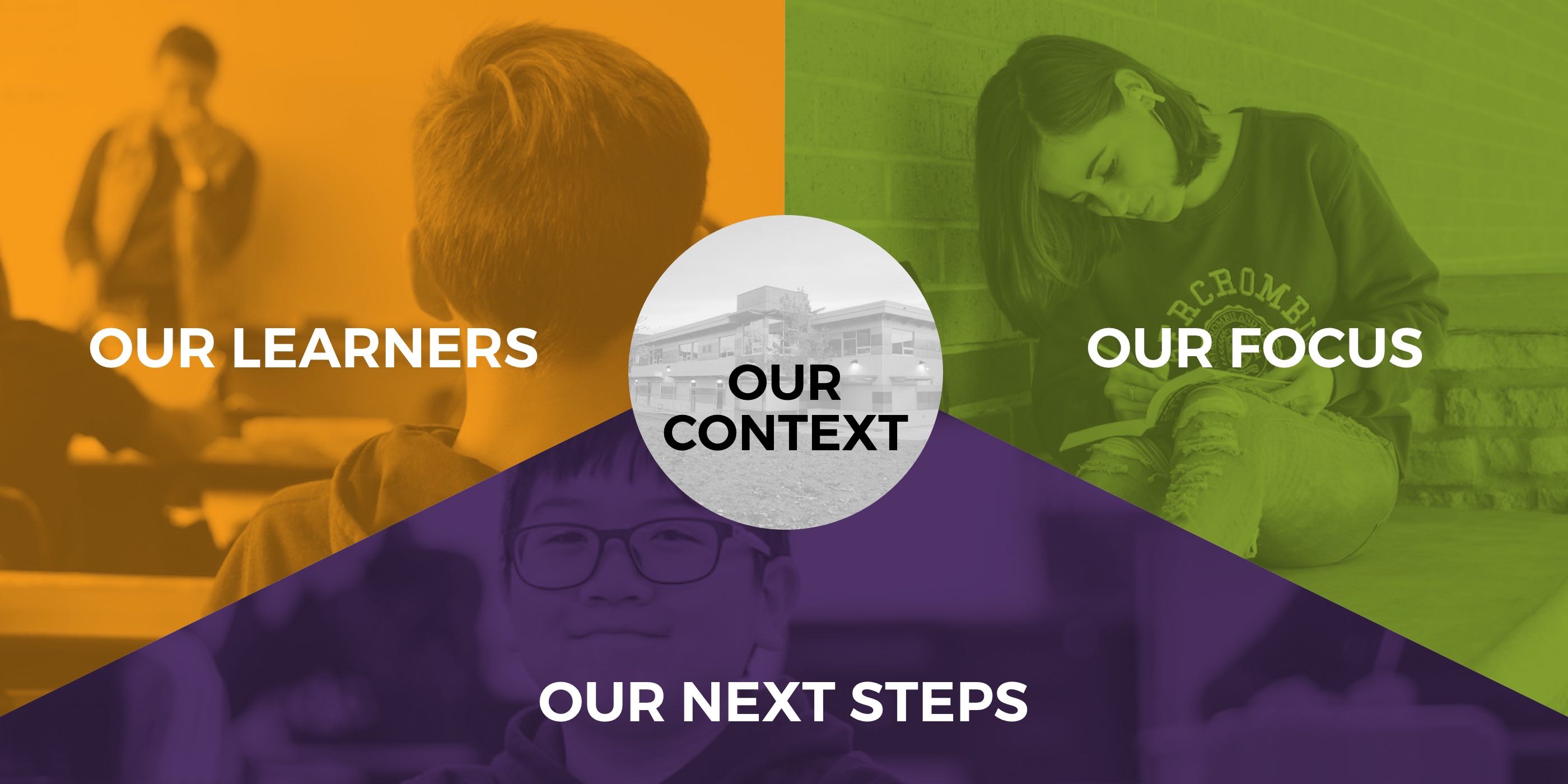

OUR CONTEXT
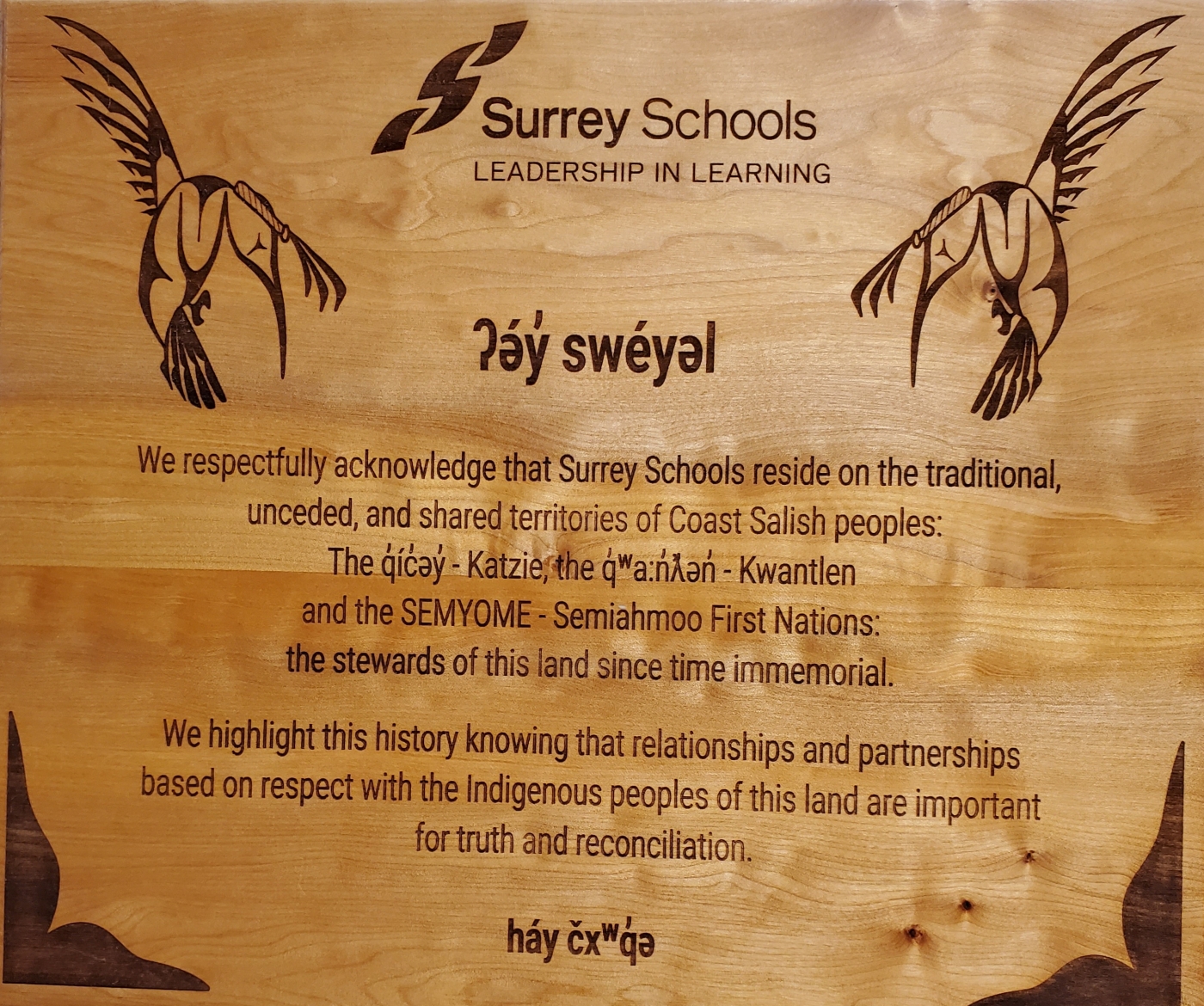
OUR LEARNERS
At Don Christian, we believe that literacy skills are the foundation of lifelong learning and full participation in society. Reading enables us to better understand and connect to the world and people around us. It empowers students to make meaning, think critically and creatively, and reach their full potential. Throughout the grades, literacy is applied across all areas of learning. Teaching effective decoding and comprehension skills is essential to the overall success of Don Christian students.
At Don Christian Elementary, our learners are curious, capable, and engaged. Through meaningful experiences and intentional instructional practices, we nurture their growth as critical thinkers, collaborative learners, and joyful readers. Students are encouraged to explore ideas deeply, work together respectfully, and develop a lifelong love of learning through reading, writing, speaking, and listening.
Here are some examples of our learners at Don Christian:
Our students develop critical thinking skills.
Our students engage in daily activities that help them develop critical thinking skills. By analyzing characters, settings, and plots in various texts, they learn to make predictions, draw inferences, and identify the main ideas and themes, fostering a deeper understanding of the material.
Sandy Solutions: Building Critical Thinking One Castle at a Time
In the photo below, students are engaged in building sandcastles—an activity that naturally encourages critical thinking. As they design and construct their structures, students plan ahead, test materials, and problem-solve when their ideas don’t go as expected. They make decisions about stability, shape, and tools, all while collaborating and adjusting their strategies in real time. This hands-on learning helps develop reasoning, perseverance, and the ability to evaluate and improve on a plan—key elements of critical thinking.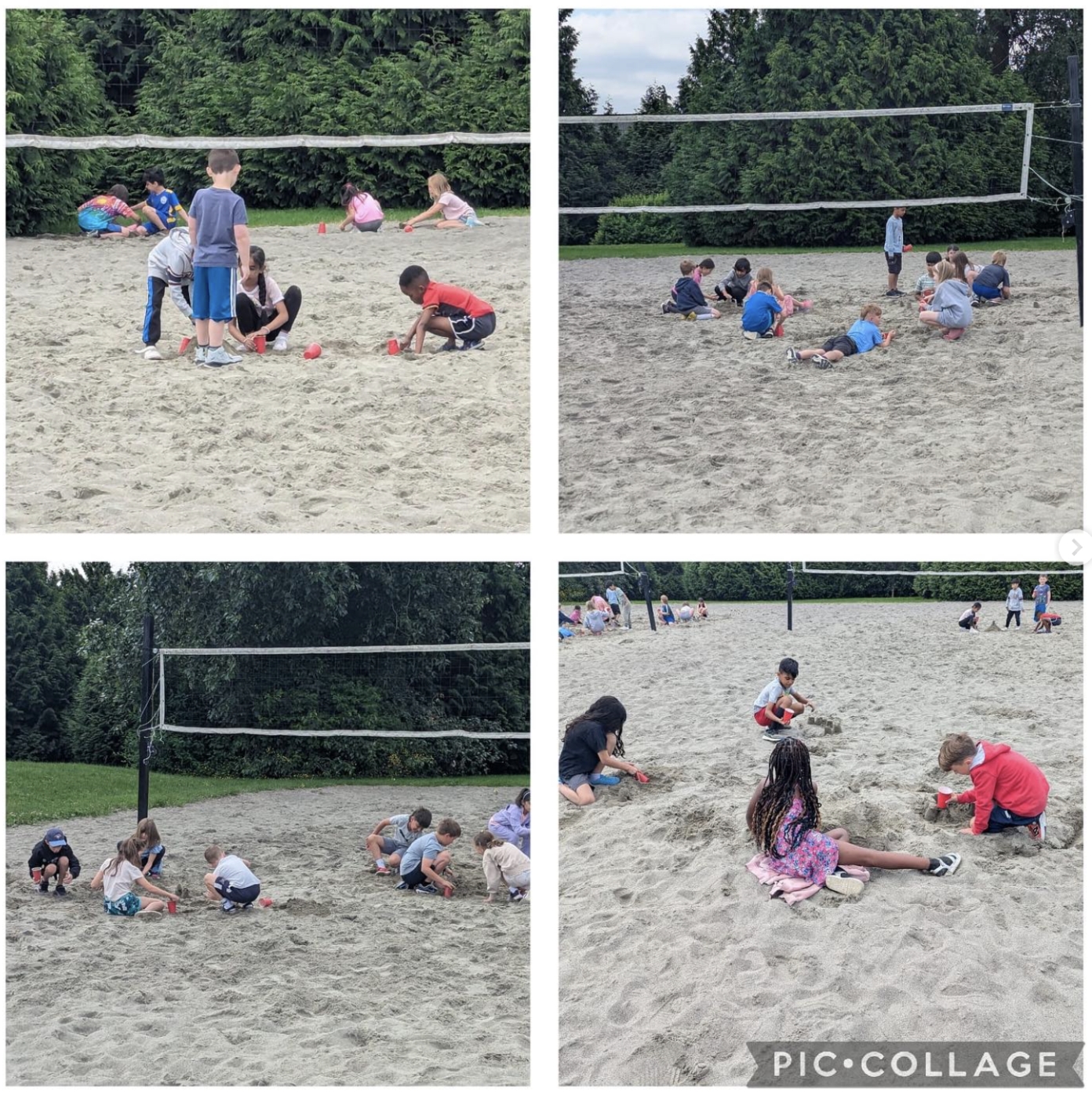
Buzzing with Ideas: Thinking Critically About Bees
Grade 2 and 3 students explored the world of bees and beekeeping through books, videos, and hands-on activities. As they learned about pollination, hive structures, and the role of bees in food production, students asked thoughtful questions and made connections to real-world environmental issues. They considered the impact of human actions on bee populations and discussed ways we can help protect pollinators. This learning encouraged critical thinking by challenging students to analyze information, evaluate cause and effect, and explore solutions to real ecological problems.

Building Our Community Together
Kindergarten and Grade 1 students worked together to design and build a model community using loose parts. They included both natural and human-made features—such as rivers, roads, parks, and buildings—and added labels and community helpers to bring it to life. Through this collaborative project, students shared ideas, listened to one another, and made decisions as a team, learning how to communicate and compromise. As they planned and created, they used critical thinking to solve problems, consider the needs of a community, and explain the purpose of each feature they added. This hands-on learning experience combined creativity, cooperation, and thoughtful design.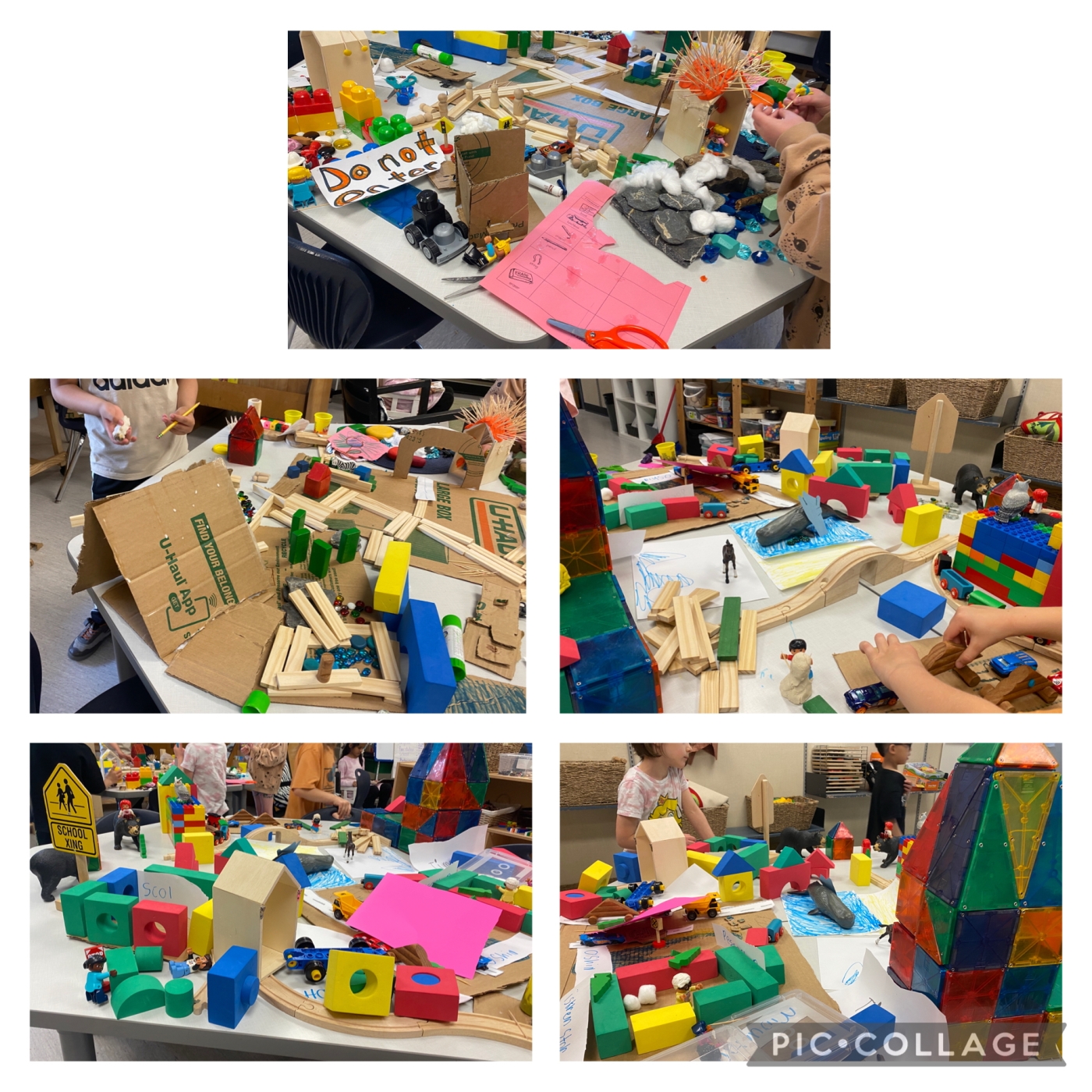
Our students learn collaboratively
Don Christian students engage in activities like reader's theatre, literature circles, and other collaborative endeavours fostering a vibrant and inclusive community within the school. Through these interactive experiences, the students develop critical reading skills, enhance their comprehension abilities, and cultivate a love for learning. Furthermore, these activities promote teamwork, communication, and empathy, laying the foundation for a supportive learning environment where every voice is valued.
Writing Together: Building Stories, Building Skills
Writer’s Workshop is a practice used across many classrooms at Don Christian, where students work through the writing process with purpose and creativity. Within each class, students collaborate by brainstorming ideas, drafting, self-editing, peer editing, and publishing their stories. The photo shows a student sharing their writing and making edits with a classmate—demonstrating how collaboration helps young writers reflect, refine, and grow. This process supports deeper thinking, builds confidence, and helps students see writing as both a personal and shared experience.
Once Upon a Partnership
Grade 3 and 4 students at Don Christian teamed up with Grade 11 students from our catchment high school to write and illustrate their own fairy tale booklets. This meaningful collaboration fostered creativity, mentorship, and connection across age groups. The older students supported our young authors with ideas, encouragement, and help bringing their stories to life. Projects like this spark a love of storytelling, build confidence, and show students that their voices and imaginations matter.
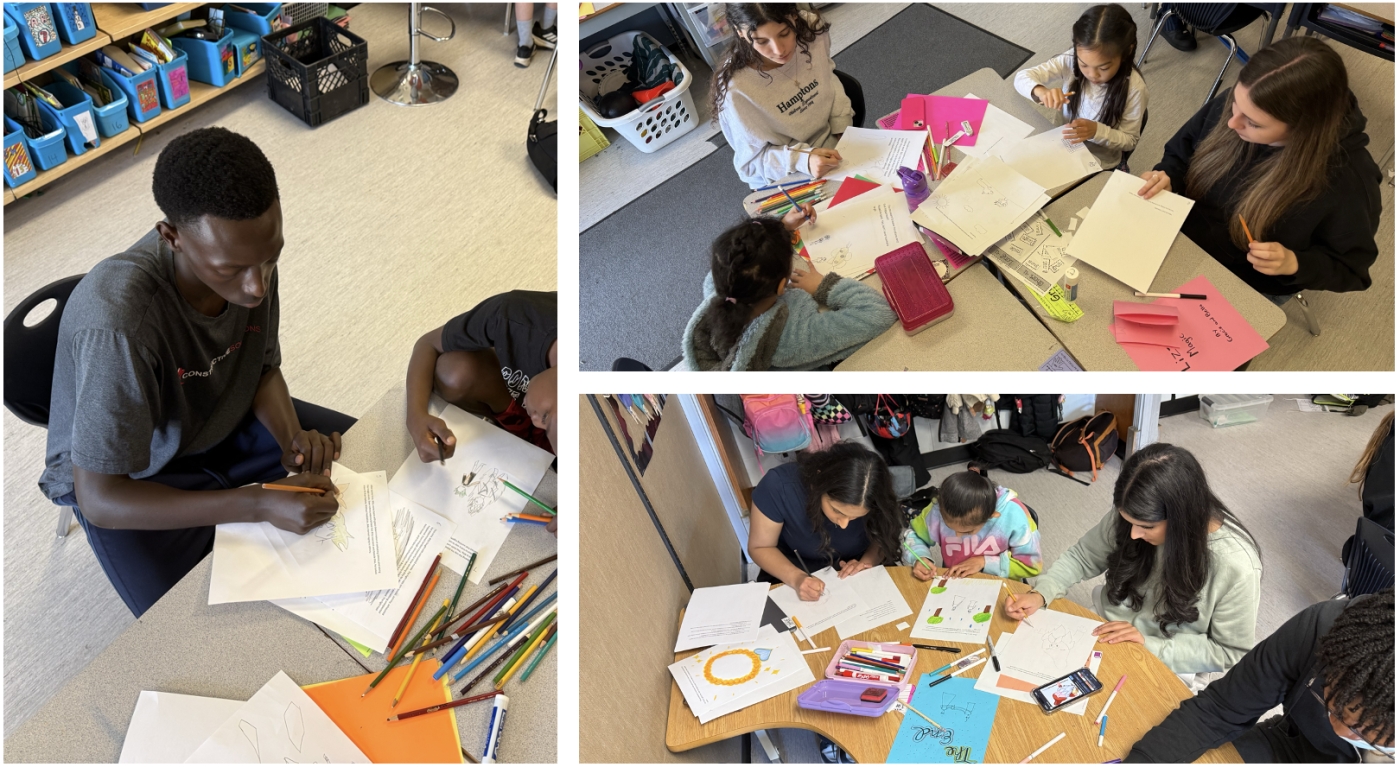
Building Our Community Together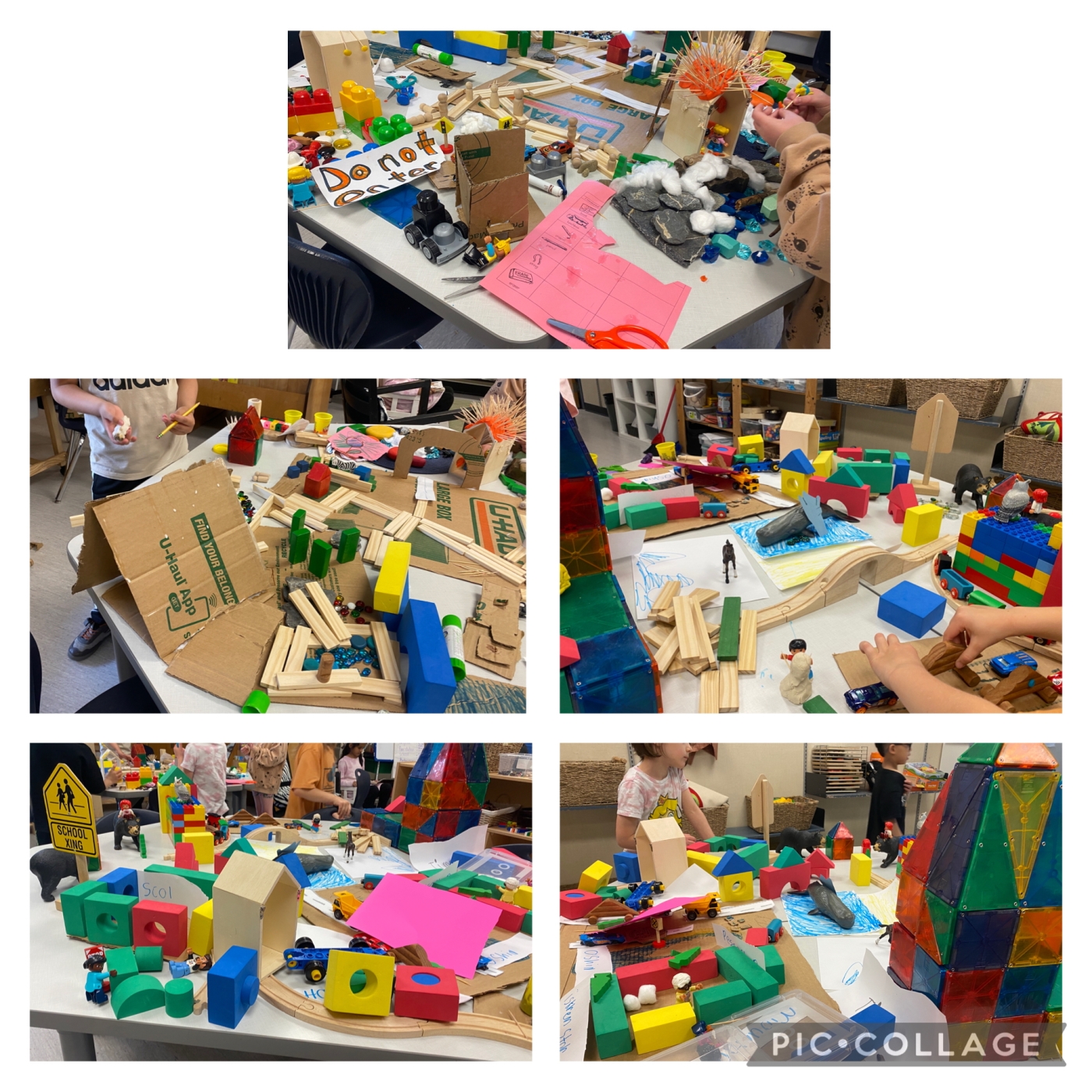
Spud Buds: Digging Into Learning
These grade 3 students are working collaboratively in "Spuds in Tubs" by planting and observing the growth of their potato plants, sharing their predictions about how the plants will develop over time. They engage in discussions, asking each other questions about the changes they see and what those changes might mean for their plants' future growth. This teamwork fosters a shared learning experience, encouraging curiosity and critical thinking as they monitor and document their plants' progress.
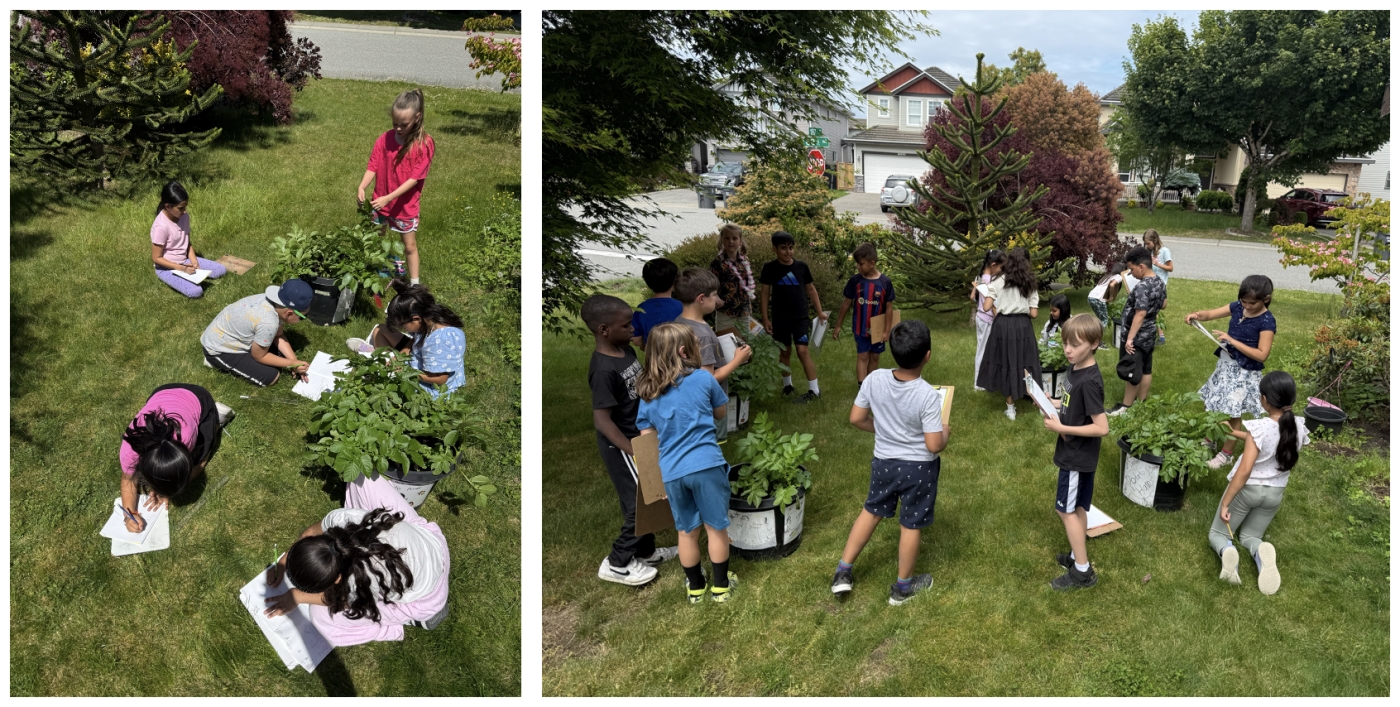
Our students are encouraged to foster a love for reading.
Our students are encouraged to explore diverse genres and authors through independent reading time. By providing a wide range of age-appropriate and culturally relevant books, we aim to cultivate a lifelong love for reading. This not only enhances their literacy skills but also promotes empathy and cultural awareness as they encounter stories from different perspectives.
Nature Meets Story: Noisy Nest in the Outdoors
Reading Noisy Nest during Outdoor Learning made the story feel alive and meaningful. Surrounded by trees and birdsong, students connected deeply with the text and felt inspired by the natural setting. After reading, they worked together to build a giant nest big enough to fit the whole class—just like the birds in the story. This joyful, hands-on experience helped foster a love of reading by showing students that stories can spark imagination, connection, and play beyond the page.

Loose Parts, Big Stories
These loose parts were carefully arranged during Story Workshop to help bring a student's story to life. Through play, imagination, and storytelling, students begin to see themselves as authors—fostering a deep connection to stories and a lifelong love of reading. This process reflects the First Peoples Principles of Learning by honouring the power of story, personal meaning, and learning through exploration and connection to community and place.
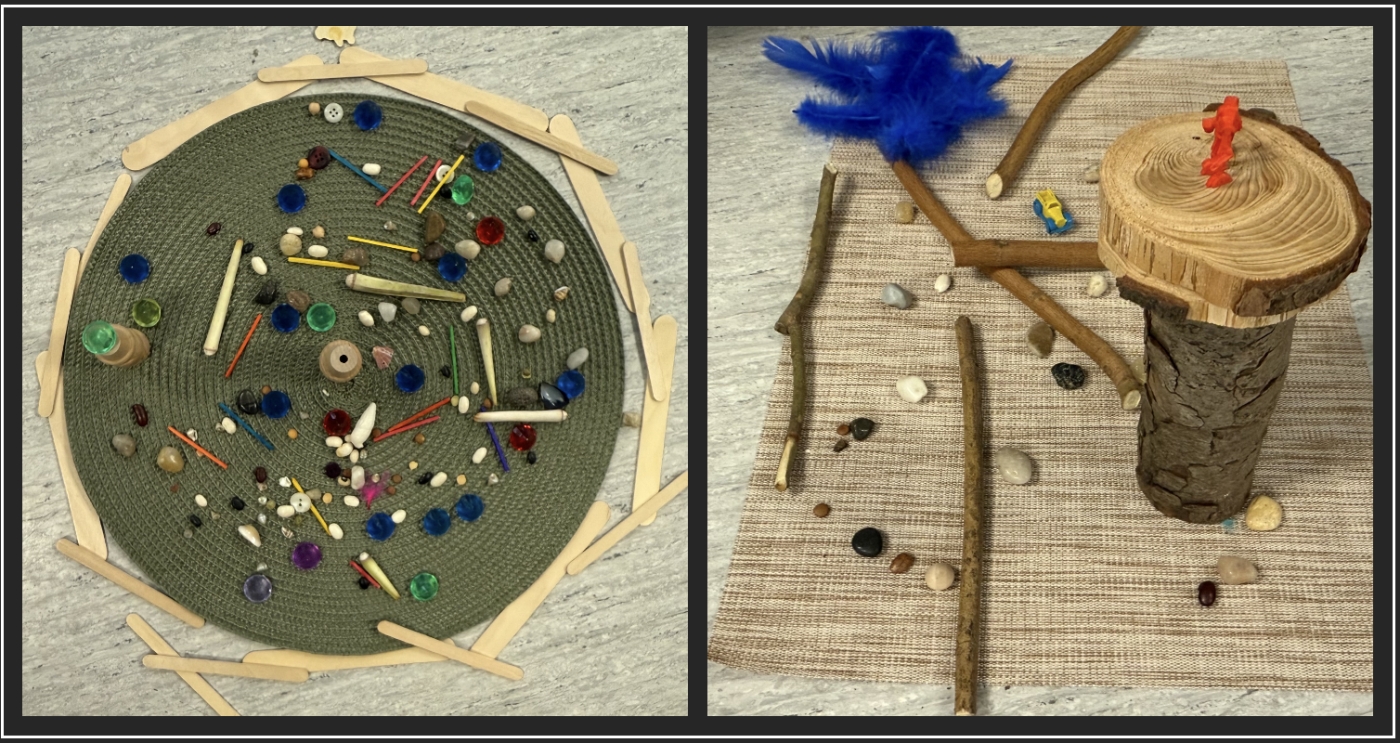
OUR FOCUS
Reading is essential and serves as a basic building block for lifelong learning. Reading helps to develop empathy and fosters connection with perspective taking, it improves critical thinking skill and it builds vocabulary authentically to enhances conversation skills.
At the core of every effective reading instruction program are the following: Phonemic Awareness, Phonics, Fluency, Vocabulary and Comprehension. While all five areas are vital to effective instruction, we have decided to track fluency as an indicator of where our students are at and whether our instruction in all five areas are leading to improved reading skills for our student population.
Our focus supports the following the following Big Ideas necessary for K-7 instruction in BC:
K-3: Curiosity and wonder lead us to new discoveries about ourselves and the world around us.
Gr. 4-7: Questioning what we hear, read, and view contributes to our ability to be educated and engaged citizens.
Our goals are for students to:
- Read fluently at grade level
- Use developmentally appropriate reading, listening and viewing strategies to make meaning
The following offers a glimpse into the dynamic learning experiences tailored to enhance phonemic awareness, phonics, fluency, vocabulary and comprehension among students. Through interactive activities and engaging tasks, students are immersed in language-rich environments conducive to developing fluency. From collaborative discussions to real-world applications, these experiences foster a holistic approach to promote reading confidence and proficiency.
Fluency Friends: Reading, Rolling, and Reviewing!
Each week, Kindergarten and Grade 1 students partner with their Grade 3 buddies to reread familiar decodable books together. After reading, the buddies quiz each other using simple comprehension questions, then play a fun “Roll and Read” game where they take turns reading individual words featuring new sound patterns. This combination of sentence-level reading and focused word practice supports both fluency and phonics development. Younger students gain confidence and accuracy in decoding, while older buddies strengthen their understanding by modeling reading strategies. The weekly routine builds comprehension, reinforces sound–symbol knowledge, and fosters joyful, supportive learning between peers.
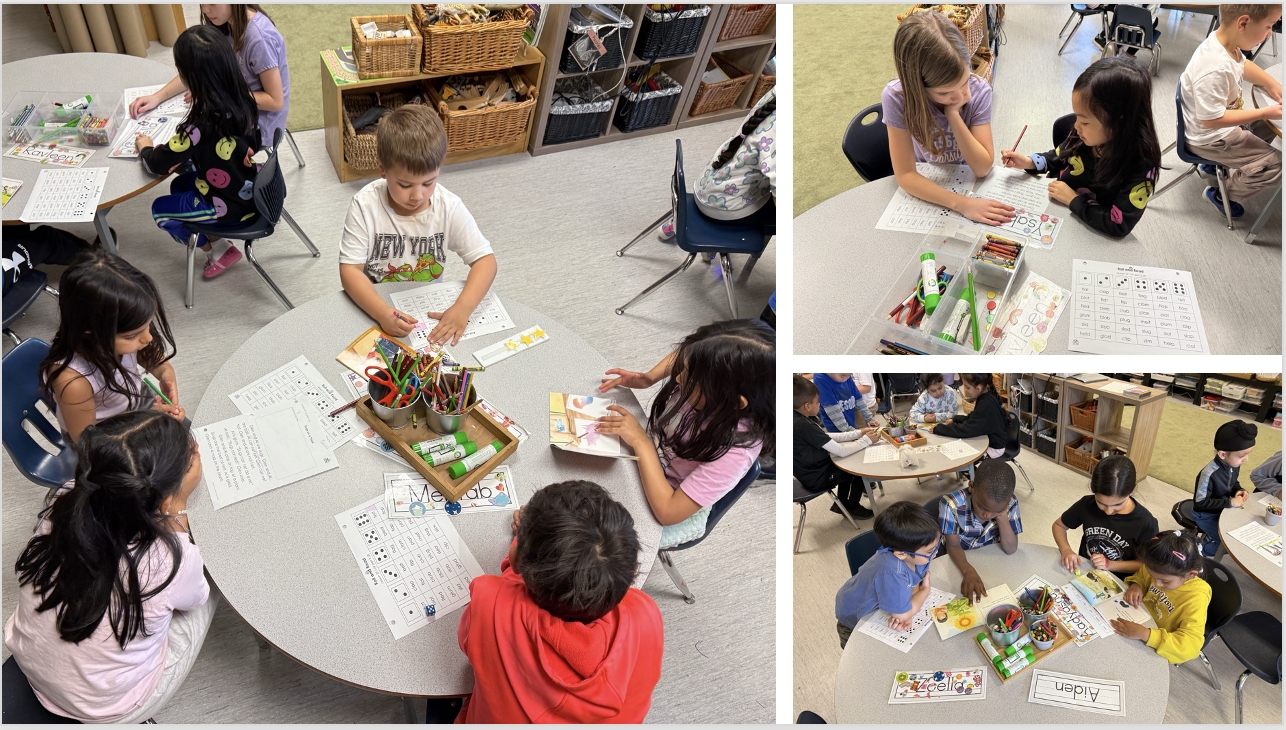
Creative Book Club Adventures: Bringing Stories to Life!
These photos show Grade 4 and 5 students diving into their book club projects. Students explore important scenes and characters, they’re not just reading—they’re really living the stories. Below is a detailed clay model of a key scene, paired with a write-up to explain its meaning. This hands-on, creative approach helps students understand the story more deeply, improves their comprehension, and makes reading more exciting and memorable—boosting their skills as confident, thoughtful readers!
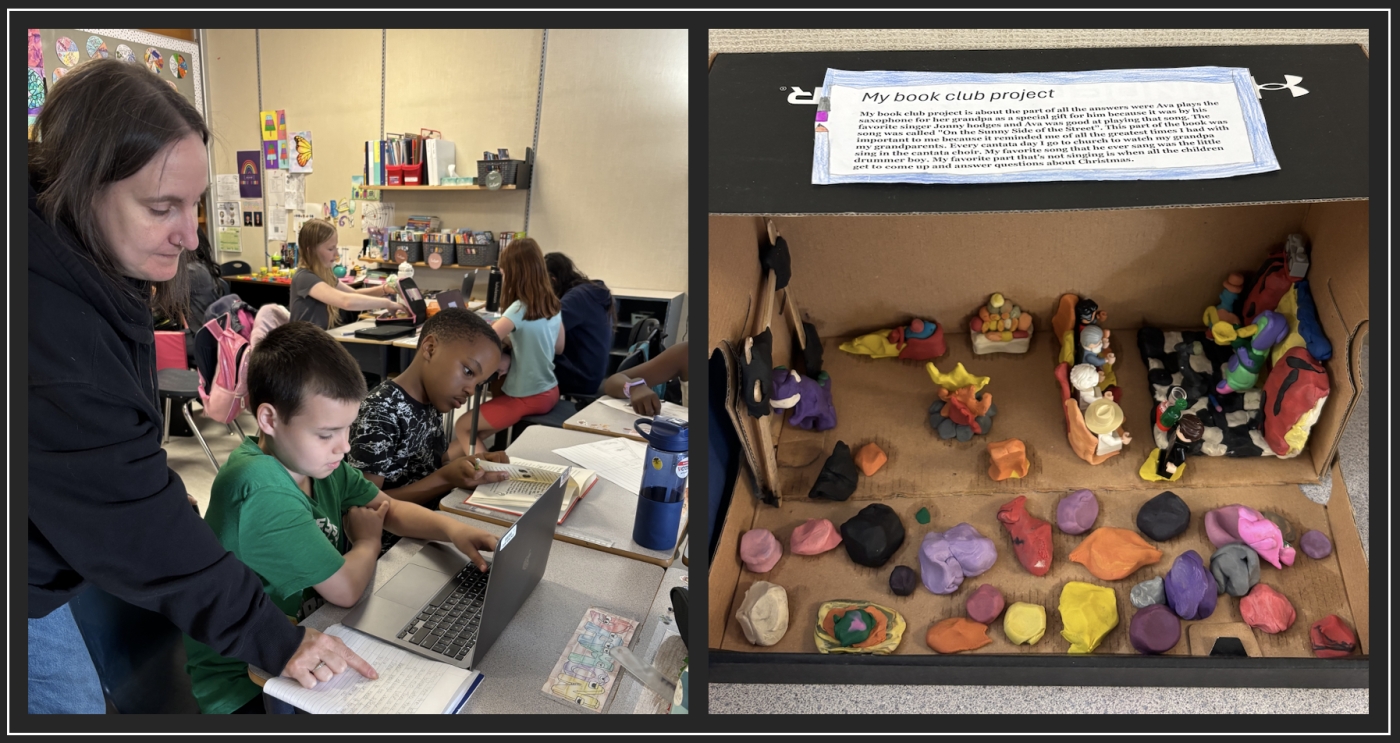
Reading Like Artists: Finding Inspiration in the World Around Us
After reading Anywhere Artist, our Kindergarten and Grade 1 students took their learning outside to explore how words and stories can inspire creativity. Using natural materials like leaves, sticks, and stones, students created their own artwork—just like the character in the story. This activity helped deepen comprehension by encouraging students to make connections between the text and their own experiences. As they retold parts of the story through their art and explained their ideas, they practiced important reading skills such as visualization, recalling details, and making meaning from what they read.
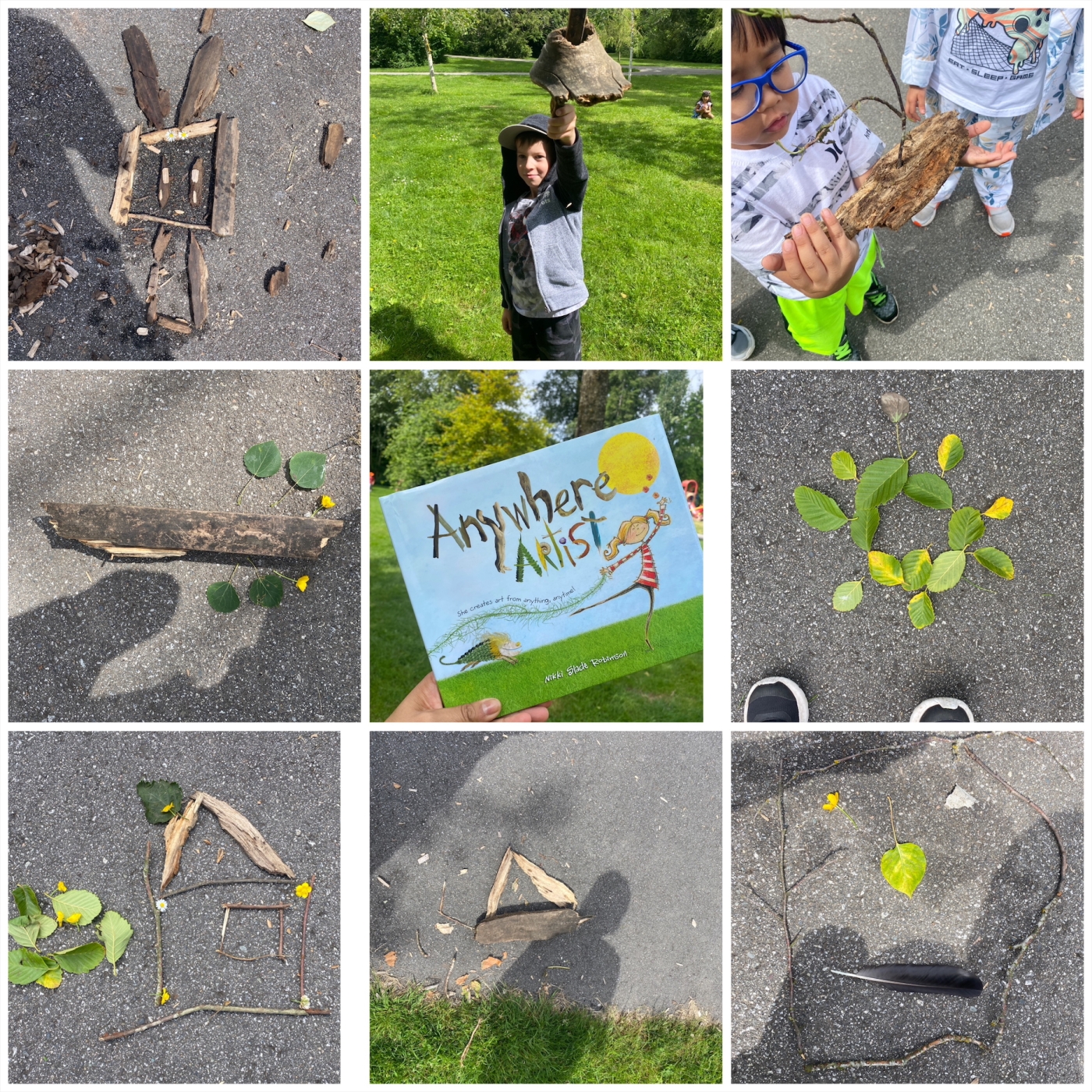
Egg-cellent Literacy Buddies!
In this activity, Grade 3 students hid plastic eggs around the schoolyard, each containing a picture inside. Kindergarten and Grade 1 students worked in pairs with their big buddies to find the eggs, write the name of the object in the picture, and create a sentence using that word. The older students supported their younger buddies by helping them sound out words, form letters, and build complete sentences. This buddy activity encouraged early literacy, oral language development, and joyful collaboration. It also fostered leadership in our older students and built meaningful connections across grades.
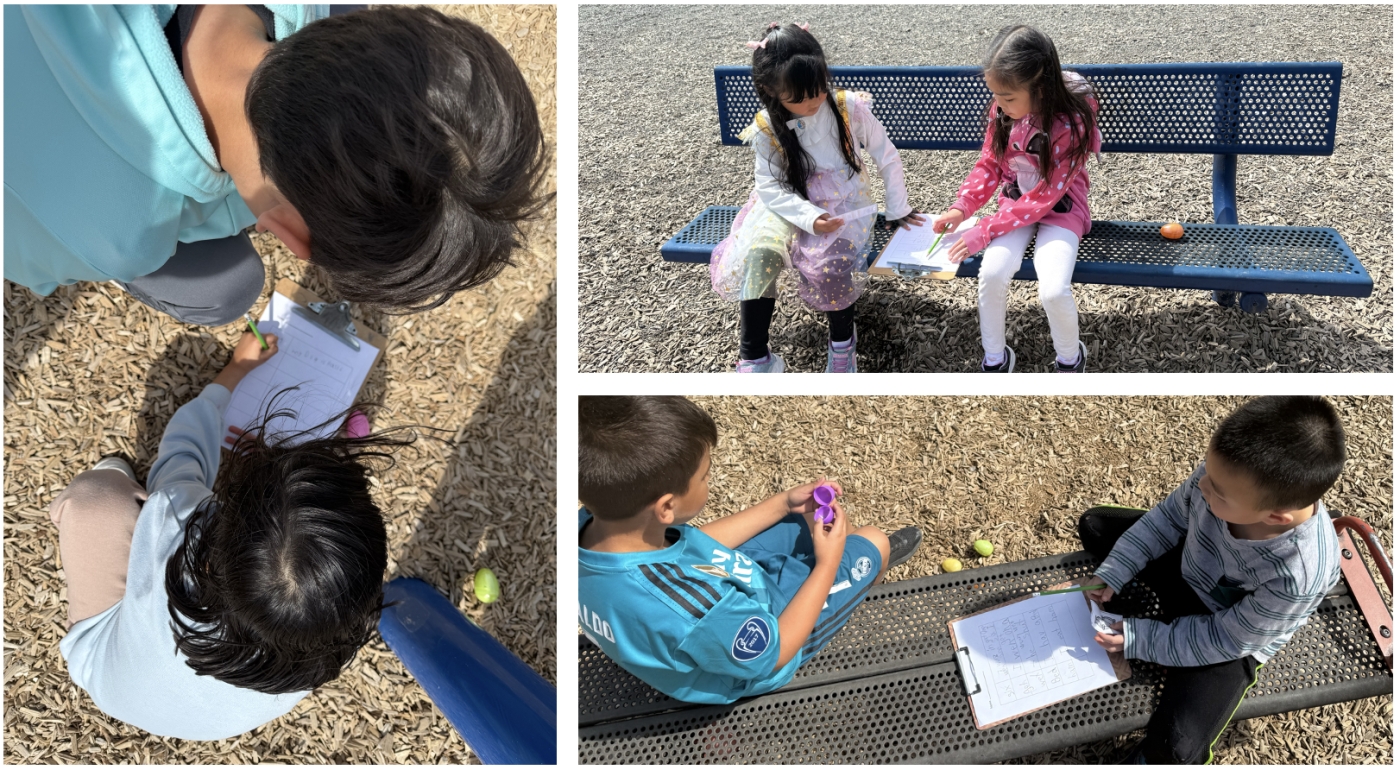
The above examples serve as a window into the diverse and immersive learning experiences students engage in at Don Christian Elementary.
OUR NEXT STEPS
For the 2024–2025 academic year, we continued our school-wide focus on reading as part of our learning plan, now in its third year. This year, we expanded our cohort to include a greater number of students from Kindergarten through Grade 6. Teachers were given the flexibility to either focus on targeted groups of at-risk readers or to gather reading data for their entire class at the beginning and end of the year.
The expanded cohort allowed us to better support a wider range of learners and to monitor progress more effectively across all grade levels. Below are the results of the collected data, along with interviews from students in a variety of grades who began the year as struggling readers. Their reflections help highlight the personal growth they experienced and the impact of targeted reading support.
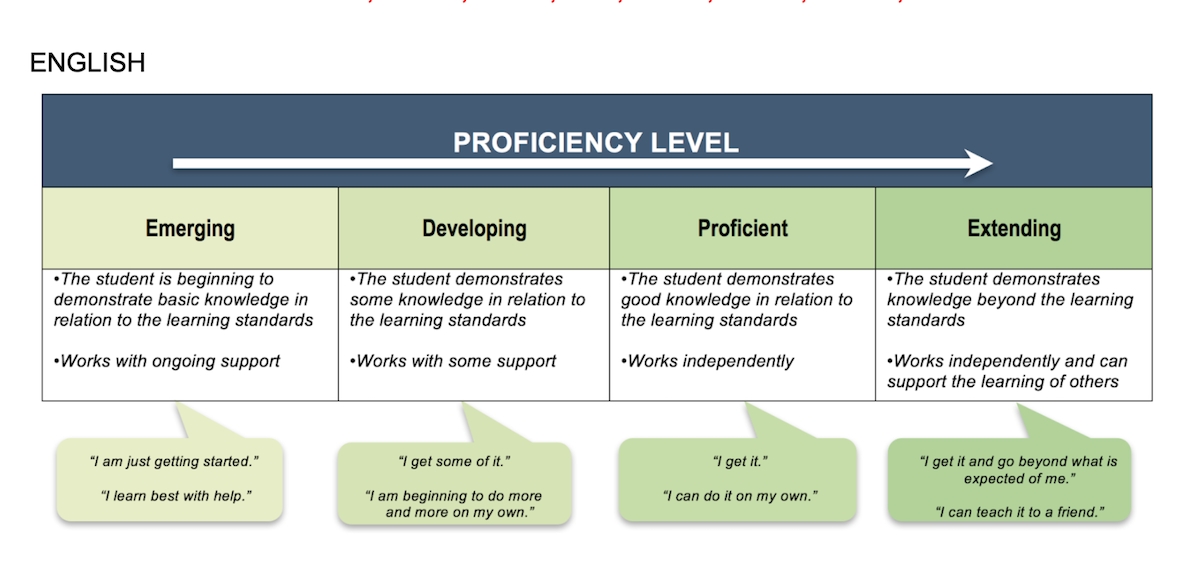
Results
The circle graphs below show students’ reading proficiency levels in September 2024 compared to June 2025. The data represents 233 students in Grades 1–6 at Don Christian Elementary who were assessed at both the beginning and end of the school year. In September, 19% of students were emerging, 26% were developing, 53% were proficient, and 2% were extending. By June, following a year of targeted reading instruction and support through our school-wide learning plan, the results showed clear improvement: 10% were emerging, 21% developing, 66% proficient, and 3% extending. These results highlight a positive shift in reading achievement, with more students reaching proficiency or beyond, and fewer remaining in the emerging and developing categories.
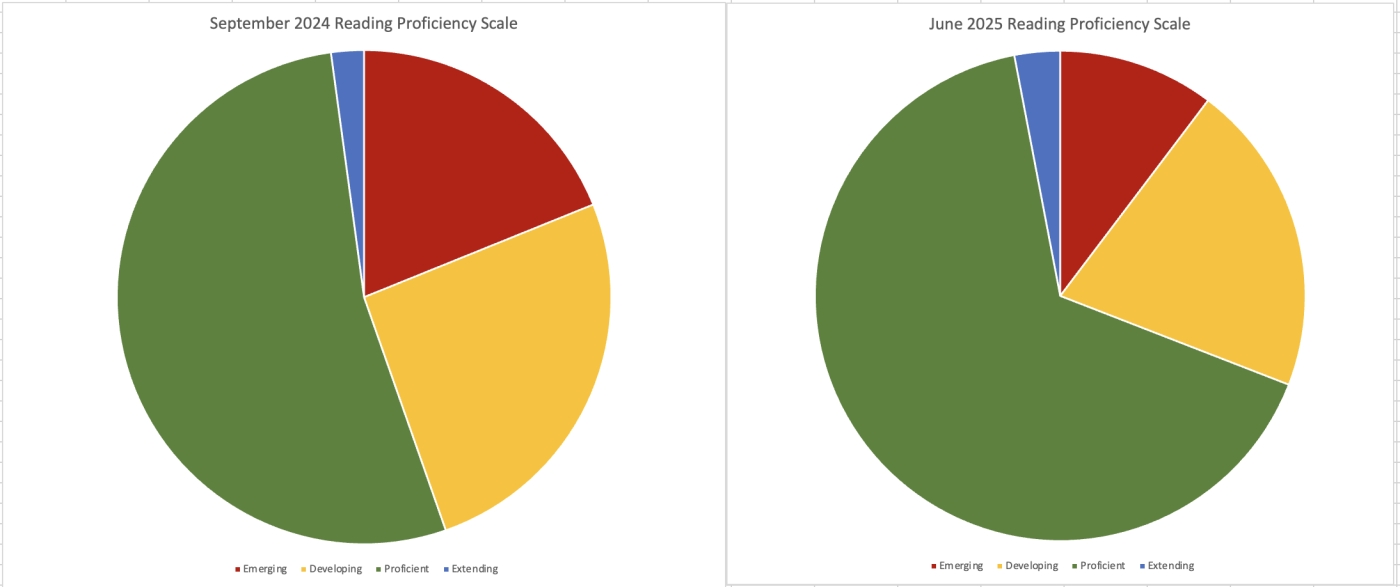
Reading Growth & Student Voice: What Our Learners Say
While assessments showed measurable growth in fluency and comprehension, student interviews provided rich insight into how reading has impacted their confidence, motivation, and self-perception.
Growing Confidence
Confident readers are more willing to take risks, engage in class discussions, and persevere through challenging texts. As confidence grows, so does independence and participation in learning.
“I feel more comfortable reading aloud now compared to the beginning of the year. I felt nervous and thought I would do terrible... now I know my reading has improved.”
— Grade 5 Student
“I’m a little more comfortable reading aloud… I don’t have as much trouble sounding out words.”
— Grade 5 Student
“I used to read quietly but now I read loud because I feel more confident.”
— Grade 4 Student
“Now I can read good and it makes me feel cool.”
— Grade 2 Student
Pride & Motivation
When students feel proud of their accomplishments, they’re more motivated to keep trying, set goals, and believe in their ability to improve. Pride builds ownership of learning and a sense of success.
“When I finished my book club books. I felt proud because I didn’t really finish books fully last year… and I actually understood it too.”
— Grade 5 Student
“I have read 3 chapter books this year during school time.”
— Grade 5 Student
“At home I read the entire book, it was Dog Man. My mom was proud of me and everyone in my family was proud of me.”
— Grade 1 Student
“When I read my decodable to my teacher. I sounded out words.”
— Grade 1 Student
“I want to help others get better at reading.”
— Grade 4 Student
Noticeable Skill Growth
Improving foundational reading skills like decoding and fluency is essential for success across all areas of learning. As students recognize their own growth, they build a growth mindset and become more engaged learners.
“I don’t have as much trouble sounding out words.”
— Grade 5 Student
“Now I can read good.”
— Grade 2 Student
“I read every word without getting stuck.”
— Kindergarten Student
Joy & Enjoyment of Reading
When students enjoy reading, they are more likely to read often—and frequent reading is one of the strongest predictors of academic success. A love of reading builds curiosity, vocabulary, and lifelong learning habits.
“I joined the summer reading club because now I enjoy reading.”
— Grade 4 Student
“A long time ago I read a flower book from the book corner. I read so fast.”
— Kindergarten Student
“Today I read the Tae Kwon Do book in the book corner.”
— Kindergarten Student
Across all grades, students at Don Christian demonstrated meaningful growth as readers and learners. They are building the skills, confidence, motivation, and love of learning that will support them in all areas of their education. Listening to their voices helps us celebrate their progress—and continue building a learning community where every student sees themselves as a reader.
Reflection and Next Steps
This marks the third year of our school-wide focus on reading as part of our Student Learning Plan. Over the past three years, we have seen meaningful growth—not only in student achievement data but also in students' confidence, engagement, and independence as readers. The success of this year’s plan is evident in both the numbers and the voices of our learners.
There was a 19% increase in students who are now proficient or extending in reading.
There are 9% fewer students who are emerging in reading.
Student interviews highlighted increased confidence and enjoyment in reading across multiple grades.
As we look ahead, the school is currently exploring new directions for our Student Learning Plan in consultation with our incoming principal, current vice principal, and the staff team. We are committed to building on the strong foundation of the past three years and continuing to support student learning in meaningful, responsive ways.
